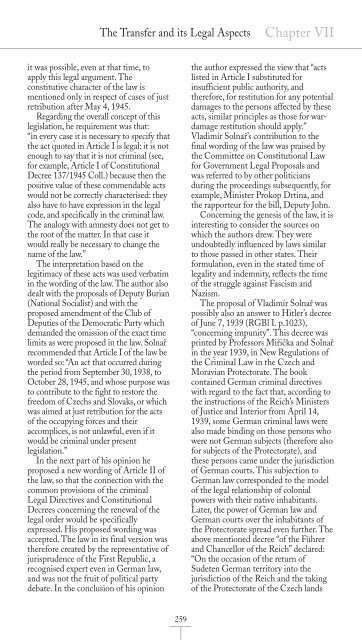the nationality of all inhabitants of the czech provinces and ...
the nationality of all inhabitants of the czech provinces and ...
the nationality of all inhabitants of the czech provinces and ...
You also want an ePaper? Increase the reach of your titles
YUMPU automatically turns print PDFs into web optimized ePapers that Google loves.
it was possible, even at that time, to<br />
apply this legal argument. The<br />
constitutive character <strong>of</strong> <strong>the</strong> law is<br />
mentioned only in respect <strong>of</strong> cases <strong>of</strong> just<br />
retribution after May 4, 1945.<br />
Regarding <strong>the</strong> over<strong>all</strong> concept <strong>of</strong> this<br />
legislation, he requirement was that:<br />
“in every case it is necessary to specify that<br />
<strong>the</strong> act quoted in Article I is legal: it is not<br />
enough to say that it is not criminal (see,<br />
for example, Article I <strong>of</strong> Constitutional<br />
Decree 137/1945 Coll.) because <strong>the</strong>n <strong>the</strong><br />
positive value <strong>of</strong> <strong>the</strong>se commendable acts<br />
would not be correctly characterised: <strong>the</strong>y<br />
also have to have expression in <strong>the</strong> legal<br />
code, <strong>and</strong> specific<strong>all</strong>y in <strong>the</strong> criminal law.<br />
The analogy with amnesty does not get to<br />
<strong>the</strong> root <strong>of</strong> <strong>the</strong> matter. In that case it<br />
would re<strong>all</strong>y be necessary to change <strong>the</strong><br />
name <strong>of</strong> <strong>the</strong> law.”<br />
The interpretation based on <strong>the</strong><br />
legitimacy <strong>of</strong> <strong>the</strong>se acts was used verbatim<br />
in <strong>the</strong> wording <strong>of</strong> <strong>the</strong> law. The author also<br />
dealt with <strong>the</strong> proposals <strong>of</strong> Deputy Burian<br />
(National Socialist) <strong>and</strong> with <strong>the</strong><br />
proposed amendment <strong>of</strong> <strong>the</strong> Club <strong>of</strong><br />
Deputies <strong>of</strong> <strong>the</strong> Democratic Party which<br />
dem<strong>and</strong>ed <strong>the</strong> omission <strong>of</strong> <strong>the</strong> exact time<br />
limits as were proposed in <strong>the</strong> law. Solnař<br />
recommended that Article I <strong>of</strong> <strong>the</strong> law be<br />
worded so: “An act that occurred during<br />
<strong>the</strong> period from September 30, 1938, to<br />
October 28, 1945, <strong>and</strong> whose purpose was<br />
to contribute to <strong>the</strong> fight to restore <strong>the</strong><br />
freedom <strong>of</strong> Czechs <strong>and</strong> Slovaks, or which<br />
was aimed at just retribution for <strong>the</strong> acts<br />
<strong>of</strong> <strong>the</strong> occupying forces <strong>and</strong> <strong>the</strong>ir<br />
accomplices, is not unlawful, even if it<br />
would be criminal under present<br />
legislation.”<br />
In <strong>the</strong> next part <strong>of</strong> his opinion he<br />
proposed a new wording <strong>of</strong> Article II <strong>of</strong><br />
<strong>the</strong> law, so that <strong>the</strong> connection with <strong>the</strong><br />
common provisions <strong>of</strong> <strong>the</strong> criminal<br />
Legal Directives <strong>and</strong> Constitutional<br />
Decrees concerning <strong>the</strong> renewal <strong>of</strong> <strong>the</strong><br />
legal order would be specific<strong>all</strong>y<br />
expressed. His proposed wording was<br />
accepted. The law in its final version was<br />
<strong>the</strong>refore created by <strong>the</strong> representative <strong>of</strong><br />
jurisprudence <strong>of</strong> <strong>the</strong> First Republic, a<br />
recognised expert even in German law,<br />
<strong>and</strong> was not <strong>the</strong> fruit <strong>of</strong> political party<br />
debate. In <strong>the</strong> conclusion <strong>of</strong> his opinion<br />
The Transfer <strong>and</strong> its Legal Aspects<br />
259<br />
Chapter VII<br />
<strong>the</strong> author expressed <strong>the</strong> view that “acts<br />
listed in Article I substituted for<br />
insufficient public authority, <strong>and</strong><br />
<strong>the</strong>refore, for restitution for any potential<br />
damages to <strong>the</strong> persons affected by <strong>the</strong>se<br />
acts, similar principles as those for wardamage<br />
restitution should apply.”<br />
Vladimír Solnař’s contribution to <strong>the</strong><br />
final wording <strong>of</strong> <strong>the</strong> law was praised by<br />
<strong>the</strong> Committee on Constitutional Law<br />
for Government Legal Proposals <strong>and</strong><br />
was referred to by o<strong>the</strong>r politicians<br />
during <strong>the</strong> proceedings subsequently, for<br />
example, Minister Prokop Drtina, <strong>and</strong><br />
<strong>the</strong> rapporteur for <strong>the</strong> bill, Deputy John.<br />
Concerning <strong>the</strong> genesis <strong>of</strong> <strong>the</strong> law, it is<br />
interesting to consider <strong>the</strong> sources on<br />
which <strong>the</strong> authors drew. They were<br />
undoubtedly influenced by laws similar<br />
to those passed in o<strong>the</strong>r states. Their<br />
formulation, even in <strong>the</strong> stated time <strong>of</strong><br />
legality <strong>and</strong> indemnity, reflects <strong>the</strong> time<br />
<strong>of</strong> <strong>the</strong> struggle against Fascism <strong>and</strong><br />
Nazism.<br />
The proposal <strong>of</strong> Vladimír Solnař was<br />
possibly also an answer to Hitler’s decree<br />
<strong>of</strong> June 7, 1939 (RGBl I. p.1023),<br />
“concerning impunity”. This decree was<br />
printed by Pr<strong>of</strong>essors Miřička <strong>and</strong> Solnař<br />
in <strong>the</strong> year 1939, in New Regulations <strong>of</strong><br />
<strong>the</strong> Criminal Law in <strong>the</strong> Czech <strong>and</strong><br />
Moravian Protectorate. The book<br />
contained German criminal directives<br />
with regard to <strong>the</strong> fact that, according to<br />
<strong>the</strong> instructions <strong>of</strong> <strong>the</strong> Reich’s Ministers<br />
<strong>of</strong> Justice <strong>and</strong> Interior from April 14,<br />
1939, some German criminal laws were<br />
also made binding on those persons who<br />
were not German subjects (<strong>the</strong>refore also<br />
for subjects <strong>of</strong> <strong>the</strong> Protectorate), <strong>and</strong><br />
<strong>the</strong>se persons came under <strong>the</strong> jurisdiction<br />
<strong>of</strong> German courts. This subjection to<br />
German law corresponded to <strong>the</strong> model<br />
<strong>of</strong> <strong>the</strong> legal relationship <strong>of</strong> colonial<br />
powers with <strong>the</strong>ir native <strong>inhabitants</strong>.<br />
Later, <strong>the</strong> power <strong>of</strong> German law <strong>and</strong><br />
German courts over <strong>the</strong> <strong>inhabitants</strong> <strong>of</strong><br />
<strong>the</strong> Protectorate spread even fur<strong>the</strong>r. The<br />
above mentioned decree “<strong>of</strong> <strong>the</strong> Führer<br />
<strong>and</strong> Chancellor <strong>of</strong> <strong>the</strong> Reich” declared:<br />
“On <strong>the</strong> occasion <strong>of</strong> <strong>the</strong> return <strong>of</strong><br />
Sudeten German territory into <strong>the</strong><br />
jurisdiction <strong>of</strong> <strong>the</strong> Reich <strong>and</strong> <strong>the</strong> taking<br />
<strong>of</strong> <strong>the</strong> Protectorate <strong>of</strong> <strong>the</strong> Czech l<strong>and</strong>s


